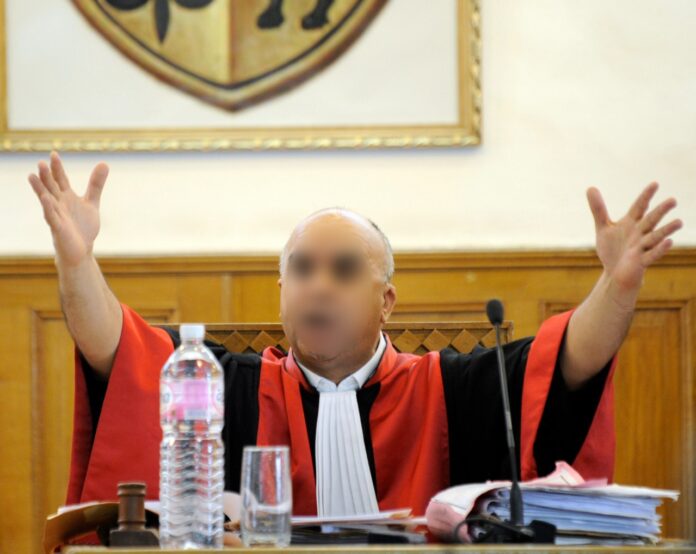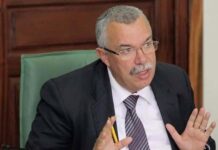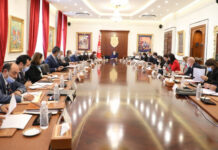The Tunisian judiciary opened a number of controversial files, as a number of officials were banned from traveling on suspicion of financial and administrative corruption in phosphate extraction and transport deals, after production stopped in recent years.
The Public Prosecution Office in Tunisia decided to ban the travel of twelve suspects on suspicions of financial and administrative corruption, in the deals of extracting and transporting phosphates, among them the former Minister of Industry Salim Feriani.
On Monday, the Tunisian News Agency quoted the official spokesman for the economic and financial judicial pole, Mohsen Al-Dali, that the Public Prosecution of the economic and financial judicial pole decided to “ban travel against twelve suspects on suspicion of financial and administrative corruption, in the deals of extracting and transporting phosphate.”
Al-Dali added that the suspects included the former Minister of Industry and Small and Medium Enterprises (referring to Salim Feriani), a former general manager of the Gafsa Phosphate Company, a financial controller at the Ministry of Finance, two directors of the Gafsa Phosphate Company, agents of private handling companies and the representative in the frozen parliament Lotfi Ali and his brother.
In a joint statement on Tuesday, a number of associations demanded that President Saied allow the executive body to activate more than 237 fetching cards issued by Tunisian courts that were not implemented.
The President’s advisor, Walid Al-Hajjam, confirmed that preventing a number of people from traveling is an administrative procedure for the people whose names were mentioned in the report of the Anti-Corruption Commission.
The associations indicated that sentences were issued against fugitives from justice in relation to files of financial crimes and grave violations of human rights.
Human rights figures believe that the judiciary has entered a new phase after Saied’s recent decisions, which included freezing the activity of Parliament and dismissing Prime Minister Hichem Mechichi, which could allow the opening of large files related to senior politicians and officials.
Ahmed Swab, a former judge in the Administrative Court, stated that “the judges have been psychologically liberated since opening the files of the most senior judges in the country” (Al-Bashir Al-Akrimi and Al-Tayeb Rashid).
He added that “there are parties that used to dominate the judiciary, such as the leader of the Ennahda movement, Noureddine Beheiri, who assumed the position of Minister of Justice in 2012,” noting that “the opening of major files is an indication of the beginning of the liberation of the judiciary in Tunisia.”
Political observers appreciated the efforts of President Said and the Tunisian judiciary to open such complex files, calling for continuing to work seriously to achieve positive results in the end.
“The travel ban is a precautionary measure,” said Mustafa Ben Ahmed, a leader in the Tahya Tounes party, describing opening this file as a “positive step to fight corruption.”
He added, “President Saied performed his duty through this initiative, which suggests addressing the practice of corruption, and now it is the turn of the judiciary, and we hope that positive results will be achieved after this step.”
President Saied had previously announced that 460 people looted Tunisian funds, offering them a settlement if they returned the looted funds , estimated at 4.8 billion dollars.
In a video speech, Saied said that work will be done to return all looted funds, fight corruption and face financial pressures on Tunisia.
He pointed out that there is absolutely no intention to abuse anyone or harm businessmen, especially those who pay taxes, saying, “I ask those involved in looting public money to deviate to reconciliation instead of facing imprisonment.”
The Tunisian judiciary has opened an investigation against Ennahda Movement, the Heart of Tunisia party, and the “Aish Tounsi” (Live as a s Tunisian) association, on suspicion of receiving money from abroad during the 2019 election campaign.
The official spokesman for the Court of First Instance in Tunis and the economic and financial judicial pole, Mohsen Al-Dali, revealed that the pole took decisions in a number of files, including parties, politicians, and well-known personalities on suspicion of receiving funds from abroad during the 2019 election campaign.
According to local media, a security unit implemented the decision to place the former undersecretary of the Court of First Instance in Tunis, Bechir Al-Akermi, under house arrest, by order of the Minister of Interior in charge, on the night of the thirtieth of last July.
The decision stipulated that Al-Akermi was prevented from leaving his residence for a period of forty days, subject to renewal, and prevented contact with him except through a licensed means of communication from those who are considering implementing the decisions of the public authority.
Recently, President Saied called on various economic and commercial structures to reduce the prices of consumer goods, amid mounting calls from observers to combat monopoly and speculation, in addition to monitoring distribution channels to address the purchasing power of citizens.
President Kais Saied, who dismissed the prime minister and froze parliament as part of exceptional measures described by his Islamist opponents as a coup, said that those involved in corruption in the phosphate sector must be held accountable and that no one should escape the law.
Tunisia, which was one of the world’s leading exporters of phosphate before the January 2011 revolution that ended the rule of President Zine El Abidine Ben Ali, is now sometimes forced to buy phosphate due to disruptions in production and transportation as a result of protests by young people demanding work, causing billions of dollars in losses.
President Saied accused powerful deputies and businessmen of instigating the protests and cutting off the railways to transport phosphate through their fleet of trucks.
Last week, the state-owned Gafsa Phosphate Company transported phosphate shipments by train for the first time in a year, after stopping following protests that closed railways in an important boost to the country’s vital phosphate industry.
Tunisia’s production of phosphate reached 8.2 million tons in 2010, but fell to 3.1 million tons last year.











